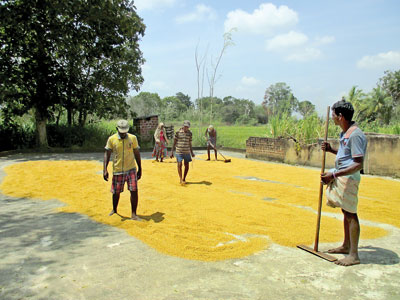News
No money for District Secretariats, private millers grab bargains
Private millers have been moving in and purchasing the paddy harvest while the state agency the Paddy Marketing Board and District Secretaries are still waiting for money from the government.

Karuwalagaswewa: Lush paddyfields and bountiful harvest. Pix by Karuwalagaswewa Jayaratne
This is the complaint heard across the districts from farmers who are gathering their rice harvest.
The PMB chief admits that money for paddy purchases has not yet been made available by the government. The Cabinet says funds have been approved.
District Secretaries have not got money from the government either.
In the meantime, rice imports by the private sector will be reviewed at the end of March, although farmer organisations say it may be too late.
The Minister of Fisheries and Aquatic Resources, Mahinda Amaraweera, who is a member of the Cabinet Sub-Committee on Cost of Living, told the Sunday Times that private rice imports will be allowed until the end of March, while halting government imports.
He believes that there is more than 100,000 metric tonnes of rice in the state-run Co-operative Wholesale Establishment and that there was no need for more state imports.
Mr Amaraweera said that Cabinet approval had been given to release funds from the Treasury to the Paddy Marketing Board for paddy purchases.
Meanwhile, farmers in areas where the rice crop is being harvested, complained that they are not able to sell at the stipulated price. The PMB has not started purchases, yet. Instead private buyers are moving in.
The government is offering Rs 38 per kilo of Nadu and Rs 41 for a kilo of Samba.
Most farmers say they have no choice but to sell their produce to the millers because they have to settle loans and pay for the agri machines and labor.
Some farmers do not have storage space, so selling quickly is the best option.
The All Island Farmers Federation, national organiser, Namal Karunaratne said paddy prices are between Rs 24 and Rs 25 a kilo.
He said that the government has yet to provide the funds to District Secretaries for paddy purchases.
“They claim that the paddy stores are open and there is ample space but still they are unable to purchase the paddy,’’ he said.
As a result, the large-scale millers and middlemen are buying up paddy at low prices.
Mr Karunaratne also said the PMB cannot purchase the entire harvest.
He accused large-scale millers of creating an artificial shortage of rice, thus creating an opening for rice imports. They buy up the harvest and release a small quantity of milled rice to the market.
“Although the paddy purchase prices are very low, several large-scale millers are controlling the supply of rice, keeping prices at between Rs 95 and Rs 110,’’ he explained.
Meanwhile, farmers and small-scale millers said middlemen and large-scale millers are buying up the harvest at cheap rates.
Indika Paranawithana, president of Kantale Govi Viyapara Ekamuthuwa, said that in Trincomalee, the PMB has not yet begun purchases, despite claiming readiness to do so.
The District Secretary has not yet started purchases because funds from the government are delayed, he said.
Farmer, Wasantha Piyasiri, who is also convenor of the Ampara Farmers Association said large-scale millers are offering Rs 28 for a kilo of Nadu and Rs 30 for a kilo of Samba.
W D K Mudith Perera, a small-scale rice miller, who is also secretary to the All Ceylon Rice Producers’ Association, said paddy prices have fallen in Ampara, Trincomalee, Kilinochchi and in the north.
He estimates that since paddy prices have fallen, a kilo of Nadu could be sold at Rs 74.
“The large-scale rice millers are fixing rice prices based on the average cost of their large stocks, but small-scale millers can only sell at cost,” he said.
He also claimed that state banks, too, provide more financial support to large-scale millers since they can repay, but the small-scale millers who are in need of financial support, are neglected.
He said that the government should maintain mills to support millers facing difficulties.
Meanwhile at the Cost of Living Committee held on Wednesday P.M.B. chairman M.B Dissanayake said that the Co-operative Wholesale Establishment (CWE) will provide them the money they requested from them. He explained that Minister Rishad Bathuiudeen has promised to provide the requested Rs. 900 Million.
“We are ready to purchase, our stores are open. The only issue is money. The District Secretaries have not received money. If they receive money they can purchase paddy even tomorrow,” he said.
He said that the harvest had been collected in the districts of Trincomalee, Ampara, and the northern regions.
He explained that the harvest in the Polonnaruwa District had not been collected, but in Batticaloa and Kilinochchi, the harvest had been bigger than usual.
“There is a price reduction in some districts. The farmers sell paddy at prices ranging from Rs 29, but we buy fresh paddy for Rs 32, while Rs 38 is paid for a kilo of dry Nadu,’’ Dissanayake said.
Duminda Priyadarshana, the head of Marketing and Food Policy of the Agrarian Business Division of Hector Kobbakaduwa Agrarian Research Training Institute, said that there was rice to last seven months.
He said that according to the Agriculture Department’s report a harvest from 814,311 hectares had been expected, but the final harvest came from 601,302 hectares.
Mr Priyadarshana said 27 metric tonnes of paddy would be harvested. This will yield 7.5 MT of rice, which would be enough until August. The harvest had been about 75 percent of last year’s.
He expects the Yala harvest to be be enough four months.
“I believe that there is ample paddy in the country. With this season’s harvest and the next season, the locals can be fed for 10 months,” he said.

